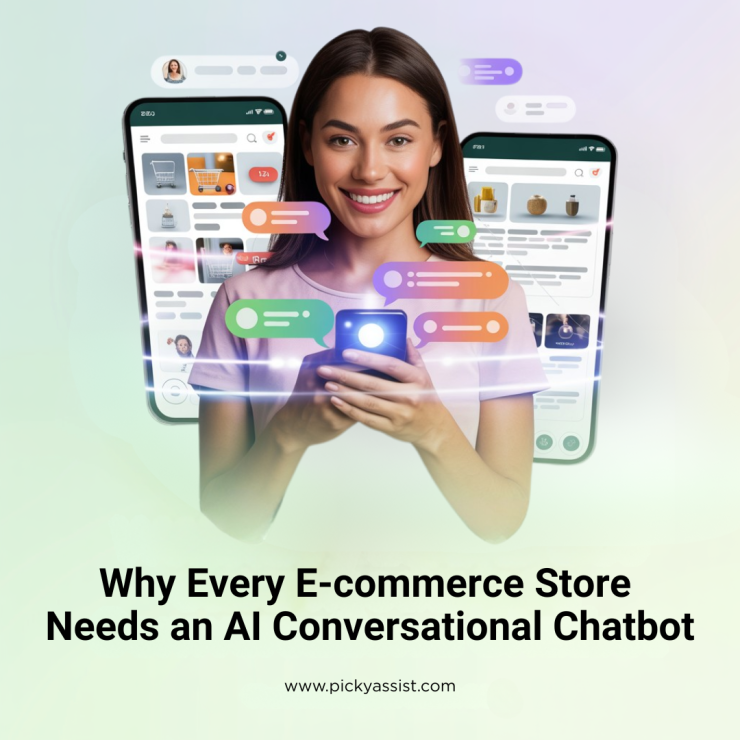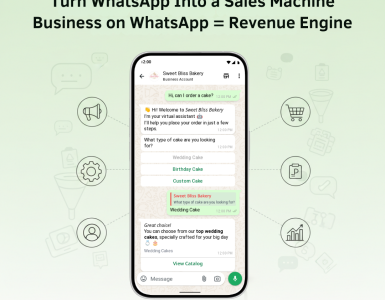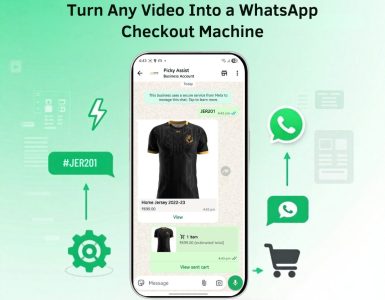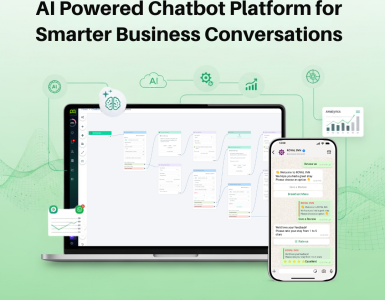Businesses need more than just a great product and a slick website. They need seamless communication channels, instant responses, and ways to engage customers right where they are. That’s where WhatsApp automation comes in, and when paired with a sophisticated AI chatbot for eCommerce, it can transform how an online store sells, supports, and retains customers.
In this blog I will walk you through why WhatsApp automation works, how it integrates with the broader strategy of using an AI chatbot for eCommerce store, what measurable benefits you can expect (with some real numbers), and how a platform like Picky Assist makes it practical for e-commerce brands.
Why Does WhatsApp Matters for E-commerce?
Instant messaging is where your customers already are
Many shoppers prefer messaging apps over email or phone calls. According to recent research, around 80% of customers favour messaging apps when engaging with brands. That means offering service via WhatsApp isn’t just a “nice to have” it’s almost expected.
Lower friction, higher conversion
When a customer receives an instant reply, browses products, asks questions and gets support all within WhatsApp, the drop-off risk is significantly lower. Picky Assist claims their WhatsApp catalog automation can help reduce abandoned carts and “sell 5× more & 10× faster”.
24/7 engagement with automation
Human agents can only go so far. An automated system using an AI chat for eCommerce can respond instantly, even outside business hours, increasing customer satisfaction and potential sales. Picky Assist cites “100% boost in first response time” and “25% rise in sales through instant engagement”.
What Role Does an AI Chatbot Play?
An AI chatbot for eCommerce sales sits at the heart of modern WhatsApp-driven commerce. Here’s how it contributes:
- Qualify leads automatically: When a visitor sends a message on WhatsApp, the AI chatbot can ask their preferences, collect contact data, tag the lead in CRM, and push them into appropriate flows.
- Product recommendations: Based on user responses, the AI chatbot can suggest items, share catalog entries, upsell or cross-sell; acting like a smart assistant.
- Order & support automation: The bot can handle order confirmations, status updates, discounts, returns queries, reducing support load.
- Lead nurturing & remarketing: If a visitor browsed but didn’t buy, the bot can send follow-up messages or WhatsApp notifications to re-engage.
When you deploy the best AI chatbot for eCommerce, you’re reducing customer waiting time, smoothing the buying process and ultimately driving more conversions.
Measurable Benefits: What the Data Suggests?
Here are some of the results you can expect (based on real-world platform claims and industry practices) when you implement WhatsApp automation along with an AI chatbot for your e-commerce store:
- Up to ~26% uplift in sales: Picky Assist shares a figure of “26% uplift in sales” via their WhatsApp commerce solution.
- 30% reduction in abandoned carts: Their solution claims “30% decrease in abandoned carts”.
- Time savings / support cost reduction: The automation reduces repetitive support queries and manual handling — enabling support teams to focus on higher value tasks. They cite “34% savings in operational costs year-on-year”.
These figures illustrate how adopting an AI bot for eCommerce via WhatsApp isn’t just hype — it has grounded ROI potential.
How to Set Up WhatsApp Automation with Picky Assist?
Here’s how an e-commerce business could implement it:
- Connect WhatsApp Business API
Begin by linking your WhatsApp account via Picky Assist, enabling messaging at scale. - Build the chatbot flows
Using their no-code flow builder you create flows such as:
- Greeting → ask what user is looking for
- Show product catalog (via WhatsApp)
- Accept input (size, colour, quantity)
- Provide payment link or place order
- Offer post-purchase upsell or discount
- Greeting → ask what user is looking for
- This is how the AI chatbot solution for eCommerce becomes embedded inside WhatsApp.
- Sync inventory / catalogue
If your store is live, sync inventory so the WhatsApp catalog shows accurate data (out-of-stock items hidden automatically). Picky Assist supports this. - Automate triggers & follow-ups
Set automatic campaigns such as: abandoned cart reminder, new product alert, loyalty message. These work via WhatsApp broadcasts and flows. - Analyse & optimise
Monitor metrics like response time, conversion rate from chat → sale, order value, repeat purchase rate. Use this data to refine the AI chatbot scripts.
Why Does an AI Chatbot for eCommerce Store Strategy Work?
Aligns with the buyer’s journey
An AI chatbot system via WhatsApp can guide users: answering pre-purchase questions, handling objections, facilitating checkout and supporting after-sales. That makes the journey smoother and more efficient.
Enhances personalization at scale
When your bot can pull user data (past purchases, preferences, cart items) it can personalise offers inside WhatsApp; a channel with exceptionally high open and response rates versus email.
Converts conversations into sales
Instead of deferring to website visit and hope, the interaction happens live. A friendly, timely chat (via an AI chatbot for eCommerce sales tool) can close the gap between interest and purchase.
Reduces cost and increases speed
Bots handle many queries that would otherwise require human agents. They reply instantly and work 24/7. This operational efficiency supports growth without linear cost increase.
Best Practices & Pitfalls to Avoid
Do’s
- Use human-tone scripts: Even though you are using an AI chatbot for an eCommerce store, the tone should feel conversational, not robotic.
- Integrate with backend systems: Ensure catalog, inventory, payment, and order tracking are connected so your bot doesn’t propose unavailable items.
- Segment and personalise: Use chat data to send tailored offers based on behaviour or past purchases.
- Track metrics: Conversion rate from chat to sale, average order value, repeat purchase rate, use these to refine.
- Always offer human handover: When the bot cannot answer a complex query, ensure escalation to a human agent.
Don’ts
- Don’t overload every chat with sales pitches: That risks alienating customers. The bot should add value (support, recommendations) not just push products.
- Don’t ignore compliance/privacy: When dealing with WhatsApp and messaging, ensure you follow local regulations and opt-in rules.
- Don’t treat the bot as “set and forget”: Like any marketing tool, it needs periodic review, updates and optimisation.
Why Choose Picky Assist for This Strategy?
- Picky Assist is a WhatsApp-approved platform (official API) and supports no-code flow building, which simplifies deployment.
- It offers features tailored for e-commerce: automated catalog, order management, payment links, inventory sync. This means you can use one platform rather than patching together multiple tools.
- They provide real-world ROI data (e.g., 26% uplift, 30% cart drop reduction) which provides confidence for decision-makers.
Conclusion
In summary, combining WhatsApp automation with a well-designed AI chatbot for eCommerce strategy unlocks significant potential for online retailers. From meeting customers in their preferred channel and reducing drop-off, to automating large parts of the sales funnel and providing real conversational commerce, the benefits are clear. With platforms like Picky Assist, you can launch quickly, integrate deeply and measure results.
If you’re running an e-commerce operation and haven’t yet looked at WhatsApp + chatbot automation, you’re likely missing a meaningful growth lever. Done well, this approach can become a differentiator, helping you win more sales, improve customer satisfaction, and build operational efficiency.
FAQ on AI chatbot for eCommerce
1. What is an AI chatbot for eCommerce and how does it differ from a regular chatbot?
An AI chatbot for eCommerce uses artificial intelligence (such as natural language understanding, user-behaviour tracking and adaptive responses) to guide users through product discovery, sales and support specifically for online retail. A “regular chatbot” may answer FAQs or support queries but isn’t optimised for selling or for the full e-commerce funnel.
2. Can WhatsApp automation with an AI chat for eCommerce really drive more sales than a website alone?
Yes, By meeting customers where they already prefer to interact (WhatsApp), providing quick answers and a simplified purchase path, you reduce friction. For example, the platform Picky Assist reports up to “26% uplift in sales” via WhatsApp commerce automation.
3. What features should a best AI chatbot for eCommerce include?
Key features include:
- Quick product recommendations/“browse catalog” within chat
- Integration with payment/order system
- Inventory sync and real-time availability
- Automated follow-up flows (abandoned cart, upsell)
- Analytics dashboard to track performance. Picky Assist offers all of these.
4. Is implementing an AI chatbot solution for eCommerce complicated?
Not necessarily. Modern tools (like Picky Assist) offer drag-and-drop or no-code flow builders for the WhatsApp channel, making setup faster. According to Picky Assist, you can “deploy in 1 hour & see visible results in days”.
5. How much ROI can I expect from using an AI bot for eCommerce on WhatsApp?
While results will vary by business and market, benchmarks from Picky Assist suggest up to 30% reduction in abandoned carts and 26% uplift in sales for proactive adopters.







Add comment